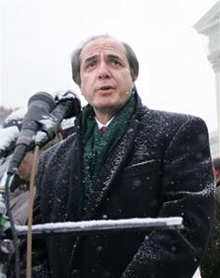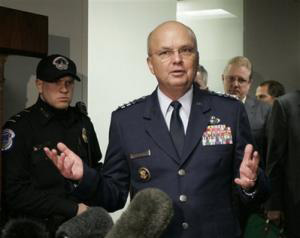 |
 |
 |
 News from Around the Americas | December 2007 News from Around the Americas | December 2007  
Destroying Tapes Violated Court Order
 Matt Apuzzo - Associated Press Matt Apuzzo - Associated Press
go to original


| | Attorney David Remes (AP) |
The Bush administration was under court order not to discard evidence of detainee torture and abuse months before the CIA destroyed videotapes that revealed some of its harshest interrogation tactics.

Normally, that would force the government to defend itself against obstruction allegations. But the CIA may have an out: its clandestine network of overseas prisons.

While judges focused on the detention center in Guantanamo Bay, Cuba, and tried to guarantee that any evidence of detainee abuse would be preserved, the CIA was performing its toughest questioning half a world away. And by the time President Bush publicly acknowledged the secret prison system, interrogation videotapes of two terrorism suspects had been destroyed.

The CIA destroyed the tapes in November 2005. That June, U.S. District Judge Henry H. Kennedy Jr. had ordered the Bush administration to safeguard "all evidence and information regarding the torture, mistreatment, and abuse of detainees now at the United States Naval Base at Guantanamo Bay."

U.S. District Judge Gladys Kessler issued a nearly identical order that July.

At the time, that seemed to cover all detainees in U.S. custody. But Abu Zubaydah and Abd al-Rahim al-Nashiri, the terrorism suspects whose interrogations were videotaped and then destroyed, weren't at Guantanamo Bay. They were prisoners that existed off the books — and apparently beyond the scope of the court's order.

Attorneys say that might not matter. David H. Remes, a lawyer for Yemeni citizen Mahmoad Abdah and others, asked Kennedy this week to schedule a hearing on the issue.

Though Remes acknowledged the tapes might not be covered by Kennedy's order, he said, "It is still unlawful for the government to destroy evidence, and it had every reason to believe that these interrogation records would be relevant to pending litigation concerning our client."

In legal documents filed in January 2005, Assistant Attorney General Peter D. Keisler assured Kennedy that government officials were "well aware of their obligation not to destroy evidence that may be relevant in pending litigation."

For just that reason, officials inside and outside of the CIA advised against destroying the interrogation tapes, according to a former senior intelligence official involved in the matter who spoke on condition of anonymity because it is under investigation.

Exactly who signed off on the decision is unclear, but CIA director Michael Hayden told the agency in an e-mail this week that internal reviewers found the tapes were not relevant to any court case.

Remes said that decision raises questions about whether other evidence was destroyed. Abu Zubaydah's interrogation helped lead investigators to alleged 9/11 mastermind Khalid Sheikh Mohammed and Remes said Abu Zubaydah may also have been questioned about other detainees. Such evidence might have been relevant in their court cases.

"It's logical to infer that the documents were destroyed in order to obstruct any inquiry into the means by which statements were obtained," Remes said.

He stopped short, however, of accusing the government of obstruction. That's just one of the legal issues that could come up in court. A judge could also raise questions about contempt of court or spoliation, a legal term for the destruction of evidence in "pending or reasonably foreseeable litigation."

Kennedy has not scheduled a hearing on the matter and the government has not filed a response to Remes' request.

Associated Press Writer Lara Jakes Jordan contributed to this report.
Hayden Lays Tape Blame on Others
Associated Press
go to original


| | CIA Director Michael Hayden (AP) |
CIA Director Michael Hayden is briefing lawmakers behind closed doors about the destruction of videotapes showing harsh interrogation of terror suspects but says he can't answer all their questions.

Hayden told reporters after testifying Tuesday before the Senate Intelligence Committee that he had "a chance to lay out the narrative, the history of why the tapes were destroyed" and the process that led to that decision.

But since the tapes were made under one of his predecessors, George Tenet, and destroyed under another, Porter Goss, he wasn't able to completely answer all questions, he said.

"Other people in the agency know about this far better than I," Hayden said, and promised the committee he would make those witnesses available.

A similar session was set for Wednesday, with Hayden scheduled to appear in a closed session of the House Intelligence Committee.

Abu Zubaydah, the first high-value detainee taken by the CIA in 2002, is now being held with other detainees at the U.S. base at Guantanamo Bay, Cuba. He told his interrogators about alleged 9/11 accomplice Ramzi Binalshibh, and the two men's confessions also led to the capture of Khalid Sheikh Mohammed, who the U.S. government said was the mastermind behind the Sept. 11 terrorist attacks. As to the CIA videotapes, President Bush said he didn't know about the tapes or their destruction until last week.

The CIA is known to have waterboarded three prisoners — Abu Zubaydah, Khalid Sheikh Mohammed, and Abd al-Rahim al-Nashiri, whom the U.S. government says coordinated the 2000 attack on the USS Cole. The CIA has not used the technique since 2003, according to a government official familiar with the program. Hayden prohibited waterboarding in 2006. The U.S. military outlawed it the same year.

Waterboarding is a harsh interrogation technique that involves strapping down a prisoner, covering his mouth with plastic or cloth and pouring water over his face. The prisoner quickly begins to inhale water, causing the sensation of drowning.

Hayden told CIA employees last week that the CIA taped the interrogations of two alleged terrorists in 2002. He said the harsh questioning was carried out only after being "reviewed and approved by the Department of Justice and by other elements of the Executive Branch." Hayden said Congress was notified in 2003 both of the tapes' existence and the agency's intent to destroy them.

The CIA destroyed the tapes in November of 2005. Exactly when Congress was notified of that and in what detail is in dispute. | 
 | |
 |



